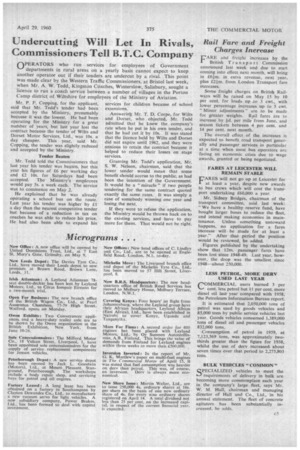Undercutting Will Let In Rivals, Commissioners Tell B.T.C. Company
Page 43

If you've noticed an error in this article please click here to report it so we can fix it.
0ERATORS who run services for employees of Government
departments in rural areas on a yearly basis cannot expect to keep another operator out if their tenders are undercut by a rival. This point was made clear by the Western Traffic Commissioners, at Bristol last week, when Mr. A. W. Tedd, Kingston Coaches, Winterslow, Salisbury, sought a licence to run a coach service between a number of villages in the Porton Camp district of Wiltshire for employees of the Ministry of Aviation.
Mr. P. F. Copping, for the applicant, said that Mr. Tedd's tender had been accepted by the Ministry, presumably because it was the lowest, He had been operating for the Ministry for a great number of years, but last year lost the contract because the tender of Wilts and Dorset Motor Services, Ltd., was 10s. a day cheaper. This year, said Mr. Copping, the tender was slightly reduced and accepted by the Ministry.
Tender Beaten Mr. Tedd told the Commissioners that last year his tender was beaten, but this year his figures of £6 per working day and £2 10s. for Saturdays had been accepted. The Ministry's employees would pay 5s. a week each. The service was to commence on May 2.
He explained that he was already operating a school bus on the route. Last year his tender was higher by El a day than the nearest competitive tender but because of a reduction in tax on coaches he was able to reduce his price. He had also been able to expand his services for children because of school extensions.
Answeriq Mr. T. D. Corpe, for Wilts and Dorset, who objected, Mr. Tedd admitted that he knew the company's rate when he put in his own tender, and that he had cut it by 10s. It was stated that the licence held by Wilts and Dorset did not expire until 1962, and they were anxious to retain the contract because it helped to reduce their losses on stage services.
Granting Mr. Tedd's application, Mr. S. W. Nelson, chairman, said that the lower tender would mean that some benefit should accrue to the public, as had been the intention of the Government. It would be a "miracle" if two people tendering for the same contract quoted exactly the same rates. It was simply a case of somebody winning one year and losing the next.
If they were to• refuse the application, the Ministry would he thrown back on to the existing services, and have to pay more for them. That would not be right.












































































































